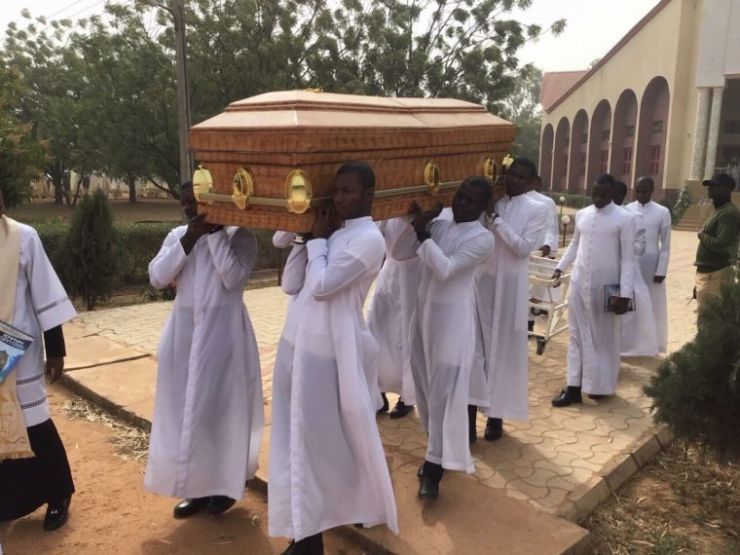
Christians who live in parts of the world that enjoy peace and religious freedom must speak up for the suffering Church in the face of increasing persecution, a new report by Aid to the Church in Need (ACN) pleads.
'Persecuted and Forgotten?' examines the situation in 24 countries between October 2020 and September 2022, and concludes that in three-quarters of places the oppression or persecution of Christians grew worse during this period.
The countries are mostly located in Africa, the Middle East and Asia but the report finds that a factor in the worsening climate is a denial in the West that Christians are the most persecuted religious group.
The situation for Christians was found to be worse in all seven of the African countries reviewed by ACN, which cited the spread of Islamic extremism and "a sharp increase in genocidal violence from militant non-state actors, including jihadists".
A particular country of concern is Nigeria, where ACN says the level of violence against Christians "clearly passes the threshold of genocide".
"Jihadism is one reason why Nigeria teeters on the brink of becoming a failed state, with kidnappings, priests killed and deadly attacks on churches becoming increasingly regular," the report says.
The report highlights the horrific murder this year of 25-year-old Christian woman, Deborah Samuel, who was stoned to death and then set alight after being accused of sending a blasphemous WhatsApp message.
The foreward to the report is written by Nigerian pastor, Fr Andrew Adeniyi Abayomi, who lost 40 parishioners when his church, St Francis Xavier's in Owo, Ondo State, was attacked on Pentecost Sunday by unknown gunmen.
He fears that the persecuted Church is being forgotten.
"The world has turned away from Nigeria. A genocide is taking place, but no one cares. Nearby security personnel and police failed to come to our rescue, even though the attack lasted at least 20 minutes," he said.
"The suffering Church needs people to speak out for us. For the killing to stop, more organisations like ACN need to proclaim the truth of what is happening to Christians all over the world. If not, we will always remain persecuted and forgotten."
The report says that the escalating violence is "often aimed at driving Christians out" and that in the past two years, Christians have been the victim of "some of the world's most vicious campaigns of intimidation orchestrated by militant non-state actors".
In Aksum, in Ethiopia's Tigray region, up to a 1,000 Christians are believed to have been killed in a massacre that locals say was perpetrated by Eritrean troops.
"State actions have hit Africa's Christians detrimentally," the report warns.
In the Middle East, the survival of important Christian communities in Iraq, Syria and Palestine is threatened by continued migration, and in some parts of the region, ACN warns that Christians are in a worse situation than during the ISIS occupation.
"Evidence came to light showing the threat to the survival of some of the world's oldest Christian communities had significantly deepened.
"The decline is most marked in Syria where, within a decade, Christians have plummeted from 1.5 million (10 percent of the population) in 2011, before the war began, to perhaps 300,000 (less than two percent of the population)," the report states.
In Iraq the rate of exodus is slower but the community remains fragile, with churches "struggling to stay open" and the Christian population dwindling from around 300,000 in 2014 before the ISIS occupation, to around half that number today.
The Christian community in Iraq and other Middle Eastern countries "feels the danger posed by the underlying menace of jihadist groups", ACN said.
"Continuing Islamist violence, for example in northern Syria, showed that even denouncement of extremism by senior Islamic leaders was apparently making little impact on the ground. Indeed, the extremist threat persisted across the region.
"More than five years on from the military defeat of Daesh (ISIS), the threat of a full-scale resurgence has by no means disappeared.
"A revival of jihadism has the potential to deliver a knock-out blow for Christianity in its ancient heartland."
In Asia, state-authoritarianism is "the critical factor" behind worsening oppression against Christians in Myanmar, China and Vietnam.
"At its worst, freedom of religion and conscience is being strangulated, as in North Korea," the report says.
Among the places where persecution is driven by religio-nationalism, Afghanistan is described as "the worst offender" due to the Taliban's hardline interpretation of Sharia law.
The report concludes, "Indicators strongly suggested that over the period under review the persecution of Christians continued to worsen in core countries of concern.
"Religious nationalism and authoritarianism intensified problems for the faithful – including the Taliban's return to power in Afghanistan, which prompted Christians and other minorities to attempt a desperate scramble to escape.
"Systematic violence and a climate of control meant that in countries as diverse as North Korea, China, India and Burma, the oppression of Christians increased.
"At the same time, despite governments starting to recognise the importance of freedom of religion or belief, the evidence of this Persecuted and Forgotten? report shows there is a long way to go to ensure the liberty of Christians and other minorities around the world is protected.
"Part of the problem is a cultural misperception in the West that continues to deny that Christians remain the most widely persecuted faith group."
Speaking at the launch of the report in the House of Lords, Bishop Jude Arogundade of Ondo, Nigeria, asked Christians in the UK to speak out about what is happening in his country.
"Many people are really suffering," he said.
He spoke about the impact of the attacks in his diocese, with many people turning to the Church for help.
Among them was a woman who suffered a serious spinal cord injury during the Ondo church attack and now can no longer use her legs.
The diocese has also given scholarships to over 20 children from families who have lost a breadwinner due to the violence.
"The government does not care about anybody, it's the Church that has to carry the burden," he said.




